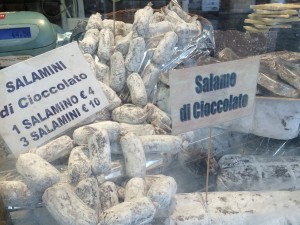What fascinates me about languages is the complete differentness of them all. As the great linguist Steve Martin once said about the French, “They have a different word for everything!” I have a collector personality, so I want one of each of them. (“Get your first foreign language today, collect all 7,000!”). 1
Highlights (for those who don’t feel like reading the whole thing):
- Italian doesn’t use the letter s to make things plural.
- The s is used at the front of a word to mean the opposite.
- There are 7 ways to say “the.” Seven!
- Google is working on a brain USB port
It’s not a secret that I’m fluent in French, pretty good in Spanish, and have dabbled in Portuguese, Italian, German, Greek, Turkish, Bengali, and Fon. (Yeah, that last one is a real language, spoken by about 2 million people in Africa and 25 returned peace corps volunteers when they’ve had too much to drink and start to reminisce about showing up at an African market and freaking out the locals with their authentic accents.) 2
Each time I learn a new language I alternate between surprise at the familiarity to the ones I already know and surprise at the things that I think are completely bizarre. Then I go to my friends and say “OK guys, you’ll never believe this. In Spanish you don’t have to say who did an action, because you change the verb if it’s ‘I’ or ‘you’ or ‘he’ etc. How weird is that?!”
Now for Italian. OK guys, you’ll never believe this! In Italian you don’t use the letter s to make things plural. You change the last letter from o to i or from a to e. So amico becomes amici and lasagna becomes lasagne. How weird is that?! What language doesn’t use s to make things plural? (OK, German doesn’t. Neither does Russian. Nor Chinese. OK most languages don’t. Fine.) And it’s really confusing when English adopts an Italian word that is already plural. 3
But Spanish, English, French and Portuguese do. There are some exceptions in French. And lots of exceptions in English. Fine, I guess it’s only Spanish that’s consistent. And now I’m thinking of Brian Regan saying “boxen” and “moosen”.
Where they do use s is at the front of a word to mean un- or dis- or mis-. So discount is just “sconto”. That’s efficiency. It’s so efficient it throws me off and I go looking up what “scarica” means just to realize it’s the opposite of “carica” (charged, like when your iphone battery is charged.)
One last crazy thing about Italian. Guess how many ways there are to say “the”. Spanish has four: el, la, los, las. French has four l’, le, la, les. Italian has seven. Seven! lo, il, l’, la, gli, i, le. Is the word masculine or feminine? Is it singular or plural? Does it stat with a vowel? Does it start with a z? Does it start with an s followed by a consonant? Is the word length a prime number? (OK I made that last one up.)
I think I’m going to have to accept that ten languages is probably the max I should expect to learn in my lifetime. I might only get to six before the Google Brain USB port lets us upload as many as we want directly into our skulls. Word of caution, don’t be an early adopter on that one. Wait until at least Google Brain 2. 4
What language would you like to learn next?
1 I also have a personality that desires efficiency. So I’m pretty much amazed that there are still so many languages. English itself has a dozen words for “food.” Does that means there are over 7,000, over 84,000 a lot of words in the world for the same thing. See! Not efficient at all.
2 “A fon gangi a?” “Un fon gangi. Ah! Yovo se fongbe!” “Edabo.” (I do miss the looks on their faces and the surprise in their voices. Them calling over everyone they know to come see this. Now they would probably just post it on YouTube or Vine or something.)
3 By the way, one of my pet peeves about Californians is that they say “raviolis.” Ravioli is already the plural of “raviolo” because Italians don’t use the letter s to make things plural! My pet peeve of Texans is that they say pronounce bruschetta as “brusheta.” The ch in Italian is aways a hard k, so it’s “brusketta”. There, equal opportunity peeves. (Send me your state and I’ll give you my pet peeve for it. It may or may not involve language.)
4 Not a real thing. Yet.

Pingback: How to Learn to Speak Another Language | A Year of Travel